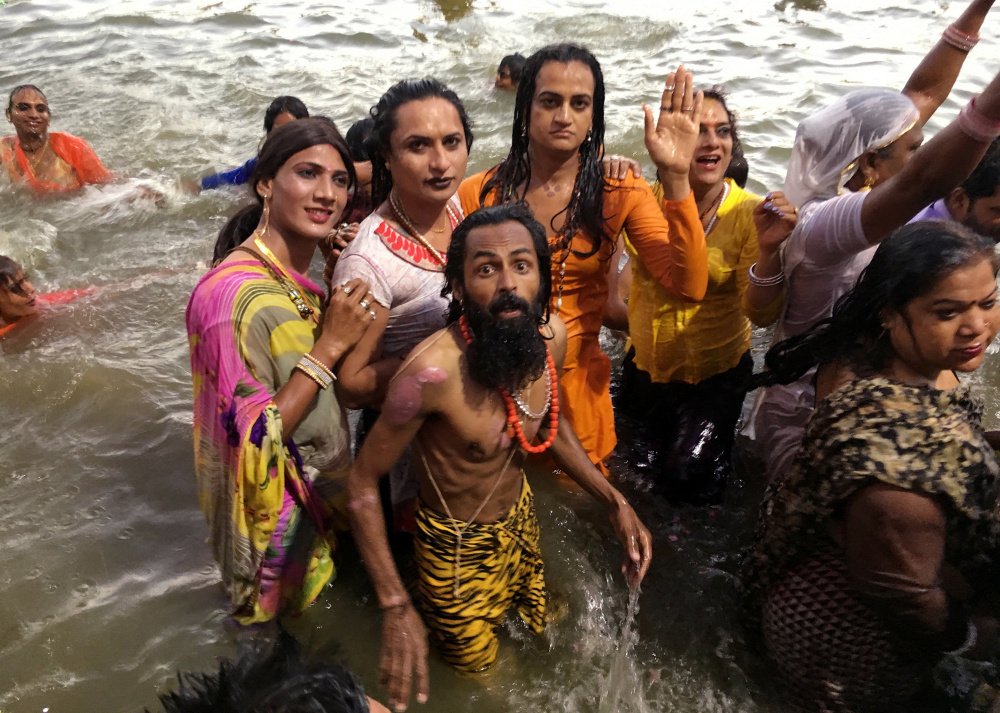UJJAIN, India — In the waning heat of the evening, a group from India’s transgender community clambered down steep steps to a holy river in India, their multicolored saris catching the breeze before they plunged joyfully into the glittering waters of the Shipra.
India’s transgender people have long lived on the margins of society and are a familiar sight at traffic stops or weddings, where they sing and dance and ask for money. But the group – known as “hijras” – have made huge strides toward greater inclusion in recent years, culminating with a landmark decision in 2014 by India’s Supreme Court that recognized a third gender that is neither male or female.
Friday, the hijras took their fight for equality to the riverbanks of one of India’s biggest holy festivals – a gathering called the Kumbh Mela. Millions of Hindu saints, holy men, seers and pilgrims will come for a month of worship, including a ritual river bath to purify body and soul.
The hijra leaders, fresh from their historic court recognition, began thinking about starting their own group to participate in the Kumbh Mela last year, according to Laxmi Narayan Tripathi, one of India’s best-known transgender activists.
“After the Supreme Court decision, we decided that we should reclaim our lost position in the religion,” she said. “Of course there is no place better to do that than the Kumbh Mela.”
The city has spent years preparing for the festival, which turns the normally quiet temple town in the central Indian state of Madhya Pradesh into a megalopolis complete with campsites, temporary places of worship, WiFi hotspots, green-friendly electric rickshaws and even tented “resorts” for well-heeled pilgrims. The river this year is dotted with floating filtration devices that clean India’s polluted river water for bathers.
The government has allotted the transgender group a space for its own camp this year as a nod toward its inclusion.
Yet the religious gurus who oversee the official 13 Hindu monastic orders – called “akharas” – that traditionally participate in the mela have said they will not recognize the hijras as a 14th akhara. Nor will they recognize a women’s group.
Those leaders say to do so would go against Hindu tradition that dates back centuries.
“We respect transgenders in society but we will not allow them for the holy dip. It’s against Hindu law,” said Narendra Giri Maharaj, the head of the All India Akhara Parishad, the umbrella group of the akharas. “We will never recognize them, under any condition.”
Tripathi and others argue that transgender people have been a part of Indian society since ancient times and that references to them appear in classical Indian texts. They were also prized courtiers during the times of the Mughal kings. It was only after the British colonized India and imprinted the land with its own system of justice that transgender people began to be ostracized, activists say.
In recent years, they have made some inroads into traditional society, becoming state legislators and mayors. Last year, the first transgender police officer was hired in the southern India state of Tamil Nadu.
In recent weeks, India’s social-justice and empowerment ministry has drafted a bill that would give transgender people greater protection from harassment and wrongful eviction. They are also likely to be included in India’s quota system, which reserves government jobs and education for disadvantaged groups.
But they say they still have had to fight for jobs and education despite the Supreme Court ruling supporting a third gender.
“The judgment of the Supreme Court is just in a file, not on the ground,” said Pushpa Gidwani, a social worker with the transgender community in the city of Jaipur. She estimates that of the 5,000 or so members of her community in that city, 1,000 keep their sexuality “hidden” and many in the group still beg or work menial jobs.
This week, transgender people from throughout India gathered at the group’s camp site in Ujjain, which included a large hall where devotees lined up Thursday evening to touch the feet of the hijras and receive their blessing. Throughout the monthlong festival, they have planned fire rituals, devotional singing and social outreach programs about the transgender community.
Rajit Ojha, a graduate student, said he has seen a “drastic change” in the treatment of hijras since the court ruling.
Copy the Story Link
Send questions/comments to the editors.



Success. Please wait for the page to reload. If the page does not reload within 5 seconds, please refresh the page.
Enter your email and password to access comments.
Hi, to comment on stories you must . This profile is in addition to your subscription and website login.
Already have a commenting profile? .
Invalid username/password.
Please check your email to confirm and complete your registration.
Only subscribers are eligible to post comments. Please subscribe or login first for digital access. Here’s why.
Use the form below to reset your password. When you've submitted your account email, we will send an email with a reset code.